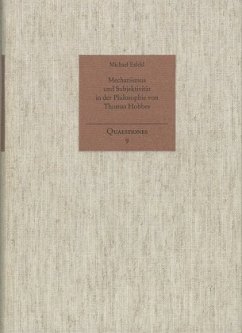Die Botschaft dieses Buch ist: Hobbes - und nicht Descartes - ist der erste, der eine spezifisch neuzeitliche Philosophie ausarbeitet. Die Manifestation neuzeitlicher Subjektivität in Hobbes' Werk wird erstmals in einer systematischen Entwicklungslinie vom Wahrnehmen bis zum politischen Handeln entfaltet. Der Autor zeigt, wie Hobbes auf der Basis einer mechanistischen Ontologie und Naturphilosophie vergeblich versucht, ein menschliches Selbstverständnis zu entwickeln und darum zu einem erkenntnistheoretischen Skeptizismus gelangt, dessen staatsphilosophische Folge politischer Absolutismus ist.
»The author has performed an extensive and thorough reading of the published works of Thomas Hobbes, and I am really impressed at how he consequently develops his own interpretation of Hobbes [...] Esfeld has produced an original interpretation of Hobbes' works and a highly sophisticated piece of systematic philosophy.« Bettina Wahrig-Schmidt, Stud. Hist. Phil. Sci.

